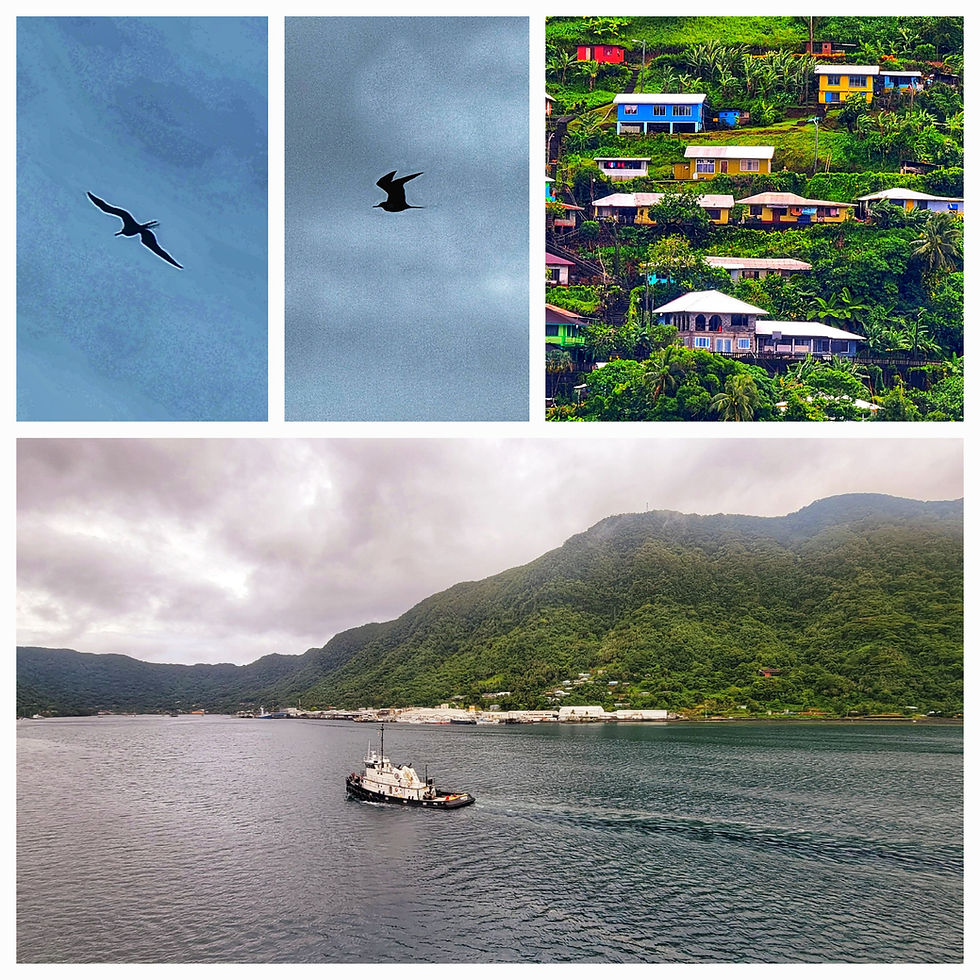The Best-Laid Plans III
- William Watt
- Jul 17, 2024
- 13 min read
Before you begin, a warning: this is a long read. 3,400 words, if you don’t count these. Also, a promise. There will be posts highlighting each port, as promised, and with more humor than you’ll find below.
Omne trium perfectum – Latin for everything that is perfect comes in threes. “The rule of three.” God comes in threes (The Father, Son, and The Holy Ghost). There are three primary colors, musketeers, and little pigs. Comic lists come in threes.
Death also comes in threes.
I didn’t know if I was going to write a third post with “The Best Laid Plans” in the title. I wasn’t sure that I wanted to write what follows at all. But friends have been reaching out to welcome Gary and I back from our 180-day around-the-world trip as The Insignia docked in New York Harbor last Friday, July 12th.
Gary and I were not onboard.
I flew home on day 156, Gary on day 169. My initial inclination was to leave it at that. It’s often said go with your first instinct, and it may be a mistake to not follow that axiom now. But when I found myself dismissing the reason I came home as “nothing serious, not like there was anything REALLY wrong with me,” I realized that I needed to be upfront. If not for me, then perhaps for someone else that has, is, or will be dealing with something similar.
For those who’ve known me for a long time, it won’t come as much of a surprise that I’ve battled depression and anxiety on-and-off for most of my life. Even at the age of five, I remember lying on my bed, listening to “Feed the Birds” from Mary Poppins or “Baby Mine” from Dumbo, over and over again until my pillow was wet with my tears. Did it come from being an empathic, sensitive child? Dealing with my mom’s own mental illness? Was it something inherited from my biological mother who, like my own mother, was diagnosed with borderline personality disorder? Probably a combination of all the above. But, luckily for me, except for a rough six months in 1999, antidepressants have worked well for me the past almost thirty years.
In April of this year, a little more than halfway into our cruise, the antidepressant I’ve been on for fifteen years grew less effective until, in late May, it stopped working all together.
At least, that’s what it felt like; but it turns out there was more to it than that. And that’s one reason I’m writing this post – to show how depression often doesn’t just descend upon one. Sometimes it creeps down step by little step.
The other is reason: my small attempt to destigmatize depression and mental illness. Plus, my sister encouraged me to do it, and she can be persuasive.
During the initial call placed to my physician’s office while I was still on the ship, hoping to curb the depression so I could finish the journey, my doctor asked if there was any event that coincided with the antidepressant being ineffective. I immediately answered, “No. I’m on the trip of a lifetime.”
Here is a reenactment of the scene in my doctor’s office once I’d returned home, in response to the same question:
Me: No. I’m on the trip of a lifetime! What could… okay, there was one thing. While we were in Vietnam, I received a text from my sister that my biological Uncle Ian died suddenly. It was strange, because he was the only family member of mine, adopted or biological, that had fought in Vietnam. And I’d kept thinking, I need to write Ian about this or that, get his take on what Gary and I were seeing. I only knew Ian four years, but personality-wise, I was more like him than Jim, my biological father.
Doctor: Well, see something like that could—
Me: Oh, and I received a text from the husband of my friend, Kevin, who I’ve known for almost forty years – he was my best man at our commitment ceremony – that Kevin had just been released from the hospital following his seventh stroke and was entering long-term hospice for vascular dementia. I mean, only six months older than Gary.
Doctor: Okay, that’s two things that might—
Me: And maybe… We were going to see Stephen and Darren, friends of ours from London, when we docked in Southampton, but we received a message from Darren that he came home from a comedy festival and found his husband in the hallway, dead. Again, not much older than Gary.
Doctor: Now this—
Me: And my tremors suddenly have gotten worse. I mean, noticeably worse. As you know, I can’t tolerate either of the medications that can temper them. People are starting to notice and comment.
Doctor: And does that—
Me: Bother me? More than that. I’d been offered a role in an upcoming production. Loved the script. Loved the role. It was like it was written for me, although it wasn’t. The playwright wrote it with his close friend in mind, but he recently died of early onset—Anyway, I accepted the role. It was going up in Iowa City, where I’d had some of my best experiences as an actor – and I realized I couldn’t do it. The tremors were distracting me. And going on the medication would make it impossible for me to retain lines. So, I had to call up the director and bow out, with the realization that acting is pretty much behind me now.
Doctor: And do you think, perhaps, that all of that just may have contributed to your antidepressant being ineffective?
I’m fairly certain her question was rhetorical.
See, the thing I didn’t do for any of the incidents I enumerated for my doctor was allow myself to grieve; or even to process these things aloud. I was traveling around the world, and so was everyone else around me. The expected emotions were joy, wonder, excitement, frustration (usually with the internet, which was horrible). The number of times I was asked “Why aren’t you smiling?” before I was depressed was depressing. I don’t know if I’ve always had resting mope face, or if age and gravity have taken a toll on the corners of my mouth. So, I felt the need to brush aside anything difficult, and put up a mask as I slowly descended into the depression.
And the descent was slow. I first noticed that I wasn’t quite myself--or it might be more accurate to say reverting to my younger self—when we were in Colombo, Sri Lanka. Gary and I had signed up for a meditation retreat with a Buddhist monk. After sitting in the lotus position for about fifteen minutes, my body, never more flexible than an ironing board, started to scream at me, “Move!” And rather than move into a position that my body could tolerate, I chose to stay put and suffer. And then, that tiny voice that is inaudible unless depression turns up the volume, started repeating over-and-over that my pain and discomfort was the universe passing judgment on me. When I realized that I believed the voice – well, that was the first sign that I wasn’t myself.

The second sign came a few days later when we were in Mumbai, India. During an excursion to the Elephanta Caves, I dropped my cell phone while attempting to get a photo of a monkey licking a lollipop that it had just stolen from a child, chipping the screen just enough that it went dark and became inoperable. Unless it was repairable, I would lose the 1200 photos that I had yet to transfer over. The amplified tiny voice told me that Gary would never forgive me for ruining the trip. Outside the depression, it’s difficult for me to fathom how I could believe that losing photos of things Gary had also taken photos of could negate the amazing time we’d had in, up to that point, eighteen countries. But inside the echo chamber of one’s depression, that voice convinces one that it’s the only voice honest enough, courageous enough, cruel enough, to tell you the truth.

In The Seychelles, I communed with a giant tortoise for about five minutes, neither of us looking away. When the tortoise finally did turn its head, the voice shattered the perfect Zen moment with, “See, even the tortoise finds you depressing.”
My anxiety level started rising as more and more I worried that the mask I was hiding behind would slip, and everyone I’d come to know on the ship would see everything the voice was telling me (and let’s be clear—THE VOICE WAS JUST MY OL’ INNER VOICE—I WASN’T ACTUALLY HEARING VOICES). In Durban, South Africa, when a vast majority of our onboard friends left the ship for four- or five-day safaris, I was stunned to find that I felt incredible relief that I couldn’t screw anything up in front of them—only for the anxiety to return twofold upon their return in Cape Town.
One night, following a dinner with friends in which I’d had difficulty engaging, Gary and I returned to the cabin where I crumpled on the bed sobbing. “I’m exhausted pretending I’m like everyone else. I’m too tired to pretend I fit in.”
I feel nothing but embarrassment writing that. Outside my depression, it sounds so maudlin, melodramatic and self-pitying. And not remotely true. But inside the cocoon of the depression, it rang absolutely true.
The next morning, I had enough clarity to tell Gary I thought my antidepressant had stopped working a few weeks ago. Not that he needed to be told. By then, my appetite had decreased to the point of not finishing meals. And there are only so many times that your husband sees you break down and cry for no reason before he realizes something’s up. Besides, our stuffed Eeyore kept rolling off the bed. And when a fictional despondent donkey thinks it’s too depressing to hang around, that’s saying something.

I went to the medical bay when it opened, only to be told (unsurprisingly) that there was nothing they could do. I would need to call my doctor to prescribe something, and then the medical office could call ahead to our future ports to find a pharmacy that could fill it.
In the meantime, Gary and I decided that the best course of action was to privately tell the people we’d become close to what was going on, allowing me to drop the mask I’d felt so pressured to hold up. This could have gone terribly wrong. (So much stigma still surrounds mental illness, thus the impetus for blogging about it candidly.) Instead, I can’t imagine how it might have gone better. (Well, in one case, it could have, but only because in my stupor, I was unable to distinguish between a friend’s sense of helplessness in the situation as indifference.)
By being up front about it, it took some of the pressure off me to be in “performance mode” at all times. I could excuse myself early from the dinner table, which I needed to do a couple times, and not leave friends wondering if they’d done something. I asked to join two friends who would spend an hour or two lounging on the pool deck, with the understanding that there was no need to try engage me in conversation. The result? Because I didn’t feel the need to put up a front, I eased into the conversation they were having, relaxing and enjoying myself.
Another friend we’d made in the second-half of the cruise was an occupational psychologist. While having coffee together one afternoon (well, I don’t drink coffee, but it was in Barista’s, the coffee bar, so…) she shared that, although she didn’t know me terribly well or long, she had already learned three things about me: I was highly intelligent (she SAID she didn’t know me well), I was incredibly empathic, and very sensitive to people’s feelings. She explained – and as many years of therapy as I’ve had, I’d never heard this before – that depression would only heighten the latter two things. I’d be even more empathic and more sensitive of the feelings of others, but the depression would distort my perspective. I might sense that someone was hurting, or angry, or distracted, and jump to the conclusion that I must be the cause of it – which is exactly what happened with my one friend, hurting us both a bit in the process. Being armed with this information wouldn’t stop it from happening, but it alerted me so that I might avoid it.
A couple from California we’d become friends with were both in the medical field. She was a medical researcher; he was a doctor. When I voiced that I’d been weighing the possibility of leaving the ship, giving me greater access to the resources available to me, he asked if it would be overstepping if he offered to talk to me about it. I thought, “What a great way to go about offering advice.” Only he didn’t. What he did do was ask very pertinent questions, never coming down on one side or the other: What were my concerns about starting the new medication on ship as opposed to home? Which would empower me more, leaving or staying? Which environment would foster healing best?
We had this discussion while walking around the track that circled above the pool – physical activity being an important tool to combat clinical depression – and as our talk wound down, I looked down to the pool deck and saw four of our new friends relaxing on lounge chairs, companionably chatting and laughing, and I thought if I went down there right now, I’d be welcomed warmly. But just by entering the space, I would change the energy. Maybe not so anyone else would feel it, but I would. And the little voice would intrude and whisper that I was ruining everyone’s good time.
I needed to silence that voice. I would fly home as soon as possible.
Only I couldn’t allow Gary to come with me. He’d want to, of course, and when I told him of my decision he tried to insist, but I explained that I would only feel guilt for ending his trip early; I needed to be in the best possible frame of mind in order for a new medication to do its most optimal work, and guilt would only work against that. He reluctantly agreed.
I would be told by both my doctor and therapist that I’d made a lot of smart choices despite the fog of depression. This would be the obvious exception.
Once my decision was made, a few people remarked that I seemed to be a little more at peace. There’s power in taking action, to “take arms against a sea of troubles.” Oceania’s office helped me procure tickets flying me from Cape Verde to Lisbon. A night layover, with a morning flight from Lisbon to Philadelphia. A six-hour layover, then a final flight from Philly to Denver.
It was a long time between leaving the ship and arriving at my front door: forty-five hours. It would have helped if I’d slept the night before departing. I didn’t. I either walked the halls or lay in bed, staring at the ceiling. It also would have helped if I slept on the plane, but I’ve always had to drug myself to the max in order to sleep while flying. My usual cocktail of two Ambien, three Tylenol PMs, a Xanax and a belt of bourbon wasn’t available. Not surprisingly, a doctor is leery about prescribing sleeping pills to someone clinically depressed. I did manage four hours of sleep at the hotel Gary had booked for me in Lisbon. So, by the time I walked through my front door, I’d been awake sixty-six of seventy hours.
It was five days before I was able to get in to see my doctor, at which point it was agreed that I would start taking Zoloft. It was also agreed that my weight loss – I’d managed to arrive at her office twelve pounds lighter than when she’d seen me six months earlier, not something expected with someone returning from over 150 days on a cruise ship – was concerning enough to do a complete blood panel.
Good thing. My cholesterol was 80. My LDL was 27, less than half the bottom of the normal range. My triglycerides were 30. Apparently, as I’d never had high cholesterol, even when I was 300 pounds, it was a mistake for my previous doctor to put me on a statin. Everything else checked out, however, and my doctor gave me permission to eat as much ice cream and peanut butter as I wanted for two weeks.
That was almost enough to end my depression right there.
The Zoloft did have some side-effects. I half-listened, but I wasn’t concerned. I never had the possible side-effects when put on a new medication.
I should have listened. A small percentage of people starting Zoloft experience a worsening of all the symptoms that the Zoloft was meant to treat. That’s why those antidepressant commercials have the warning at the end, “call 911 if you notice an increase of suicidal thoughts.” Luckily, I didn’t have that. But I did have ramped-up anxiety, racing thoughts, tendency to catastrophize, trouble sleeping. And my tremors, already intrusive, became so intense it took me almost three minutes to screw the lid back on a jar of Miracle Whip.
And I was at home, alone, because I’d insisted that Gary stay onboard and finish out the cruise.
Only, I wasn’t alone. My therapist informed me 9-8-8, which I always thought of as the suicide hotline, is apparently a hotline offering support for any mental health crisis. In those hours when I could not get my heartrate below 100, I called a couple of times.
Also, either my therapist or my doctor was checking in on me every other day. Because of the tremors, my heartrate, and a fairly persistent lightheadedness, I was unwilling to risk driving, which kept me housebound.
But I wasn’t alone. And this is what I want to share with those who wonder what they can do when a friend is clinically depressed. Those friends we’d made aboard the ship? The ones that I was afraid of losing because of my depression? They were amazing. Dropping me little notes every day. Making sure that Gary was taken care of. Sending me photos of them having dinner with Gary. One friend sent me the daily Mensa quizzes the ship gave out and that we both did regularly. Another friend who got COVID and was confined to his room chatted on FB messenger with me for minutes at a time. What no one did was treat me like I was fragile. I didn’t have to answer the question “how are you?” (thank God, because I dreaded having to answer “worse than when I left”). Instead, they all just let me know that they were there for me.
They also let me know that Gary was only “half-there,” giving me permission to ask him if he wanted to come home, and that, if he did, I’d be happy and relieved. Gary told me he had already half-packed, and would look into flights. He flew home from Paris.
The side-effects waned after five days, and within ten days were all but gone. After the first week, I started seeing the therapeutic benefits of the Zoloft, and, at the time of this writing, I would say that I’m 90% of my old self. And yet, not so, as I will never be completely as I was before this episode. I’m now armed with the knowledge that, even when things are dark and difficult, I am capable of being my own best advocate. I’ve also learned that mental illness is stigmatized as much by those suffering from it as those who have no experience with it.
I also learned that it’s normal to feel lost when dealing with a depressed friend or family member. As one friend told Gary, “I don’t know what to say so I don’t say anything.” I wished he’d told me that. I could have put his mind at ease. There IS no right thing to say, if by “right” one means how to fix it. Sometimes the only thing one can say is “I don’t know what to say.” Or, as this friend often did for me, just be there.
If you, or someone you know, is struggling with depression and you don’t know where to turn, call 9-8-8. They can direct you to the proper resource.
If you’ve read this far - please forgive any typos or grammatical errors.
Our support system onboard and off:





Dear Bill: I am so touched by your story. I really feel for you. I am on Prozac and have been for many years - mild depression - but I feel for you. If ever you want to do something or go somewhere or talk, please feel free to call me. I did not know about your depression until just a couple days ago. But I am SO glad that the new meds are working better for you!!! Also, my therapist greatly recommends the REAL anti-depressive medicine and NOT the generic. They can be bought in Canada - but I am still trying to get a phone number so I can buy them there again. They are more expe…
Well written, my friend. Insightful for those with a loved one who lives with chronic and persistent mental health challenges as well as for those with episodic challenges. Giving ourselves grace is a tough thing. You found it and now allow others to know that we can enter your space honestly. XO
Dani
Thank you for your honesty and willingness to write about the reality of depression and how it not only effects the person diagnosed but also those who care about him. Hang in there..you are awesome and people care!
Your sister must be very intelligent and wise to encourage you like she did. Probably very good looking too.
Thank you for sharing (part of) your mental health journey. Being open and vulnerable helps us and those around us. I’m taking a note from you that when, not if, I have an acute mental health crisis, I will know to reach out and ask for what I need.
❤️❤️❤️ jess
Thank you for your courage and honesty. I'm so sorry you had to go through this. I, too, have suffered from debilitating depression and anxiety. My current meds and life circumstances have enabled me to experience a happiness I have never known before. You never know if or when your meds will stop working. You handled things remarkably well, and your insights show keen self-awareness. I'm glad that you sought help when you did, that you and Gary are both home, and that you have mostly recovered. Sending love and hugs. Dena Felice